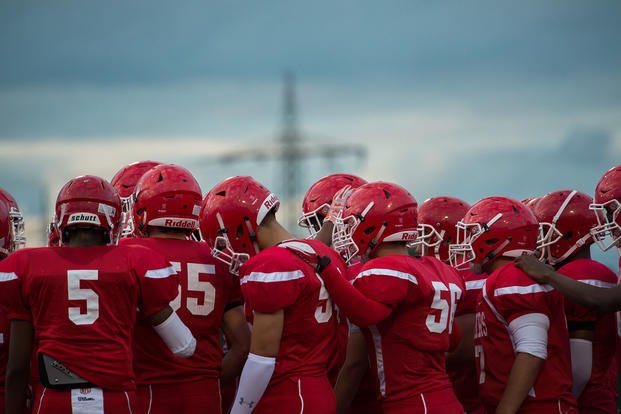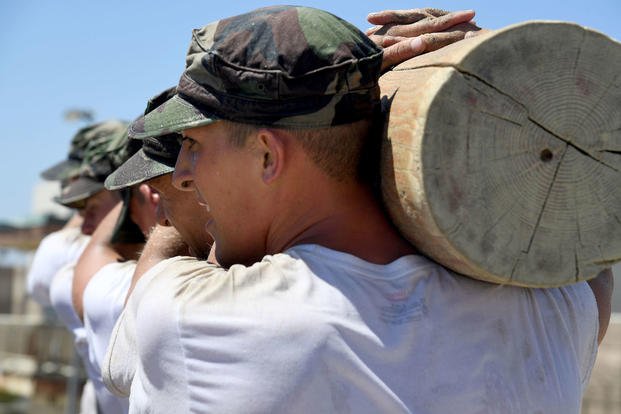Here is an email I receive quite often from teenagers who want to serve their country but are curious how to start preparing themselves for the military training, especially SEAL and other special operations programs.
Hi Stew,
If I wanted to become a Navy SEAL, when should I start training? I am 15 years old and have wanted this since I was 10. What are the requirements for becoming one? I have read some of your articles and wanted some advice on some tips toward training and getting through the course? Do I have the right mentality, etc.?
First, thanks for your decision to want to serve your country. It is always nice to see someone in their teens thinking of their future and service. What I am about to share with you is the long answer, as I get this question often and feel it deserves the full answer -- taking you from your present age in high school and to and through BUD/S.

Step 1: Learn to Be a Team Player
I cannot emphasize this enough as it requires experience and an understanding of being part of a team. Knowing how to work toward a goal, whether that goal is to drive a ball down the field or to train for an event with other team members, is important to your future training.
When I was young, I played five sports. Although never exceptional at any of them, I was good enough to be a team captain when I became a senior in high school. I truly feel that my training for these sports enabled me to understand what it means to work hard toward a goal and be a better leader and follower.
Step 2: Get Some Leadership Skills
Whether you are a team captain, class president or head of a community service group, all of these skills will help you understand what it means to lead and follow orders. Being a good leader is important, but being a good listener and able to follow rules and other leaders is just as important.
Step 3: Study Hard
Dummies usually get weeded out just as those who fail a PT test in the military. Make sure you graduate high school, perhaps get some college (good but not necessary) and study a foreign language. Any foreign language is fine at this level in high school as it is more understanding how languages and other cultures work that will help you with more important languages later (Chinese, Russian, Arabic, etc.). Also understand algebra and science, as you will see this math and physics in dive training when you apply the laws of physics to the body while diving.

Step 4: Graduate High School/GED/College
Your options start to open up when you are 17 or 18 years old. You must have a high school diploma to enlist.
They recently have started to accept a GED certificate, but depending upon your choice of service, you may need a semester of college-level classes to join the military. You can enlist as young as 17 years old with the signature of a parent or guardian, or you could attend college for a few years or graduate. Many SEAL enlisted are college graduates with advanced degrees.
So after college, you either can enlist, join as an officer by attending Officer Candidate School (OCS), or you could get a military scholarship and attend college for free by joining an ROTC college or the U.S. Naval Academy. All sources can lead to attending BUD/S as an officer. This also will give you four more years to really train hard as well.
*Note: Do I even need to say to stay away from drugs and alcohol, as they have no purpose in this training?
Step 5: If You Enlist
There are many opportunities for the enlisted SEAL or Special Ops soldier. Not only will you receive some of the best training in the world, but you also can earn thousands of dollars in bonuses.
Presently, the Navy is paying BUD/S graduates $40,000 for successfully completing the training and earning the SEAL designation. But when you meet the recruiter, you will be assigned a SEAL mentor once you have signed. SEAL mentors are former SEALs/special ops who help you prepare properly for the training you have signed to do.
You have to sign up with the Delayed Entry Program to meet with the SEAL mentor and do the workouts. You will not sign up at first as a special operator (SO); you have to pass the BUD/S physical screening test (PST) first before you can be part of the SEAL Challenge Program. This means you have to pick another Navy designation when you join, but that goes away after you pass the PST.
Step 6: Acing the PST
You want to go to Boot Camp in the best shape of your life. Do not think the Navy is going to get you in SEAL shape during boot camp. You need that foundation now, and hopefully after a lifetime of fitness and athletics, you will have the ability to build on that foundation. This means you need the following scores on the PST to have about an 80% chance of graduating BUD/S.
|
Swim 500 yards (side, breast or CSS stroke) in under 9:00 |
(sub 8:00 for officers)* |
|
80-100 push-ups in 2:00 |
(100 for officers)* |
|
80-100 sit-ups in 2:00 |
(100 for officers)* |
|
15-20 pull-ups |
(20 for officers)* |
|
1.5-mile run in 9-10 minutes |
(sub 9:00 for officers)* |
*Officer billets are much more competitive and require higher scores to be accepted generally.
Just reaching the minimum standards will give you a 6% chance of graduating BUD/S. What you need is a fitness program to achieve these scores.
For the enlisted, the good news is that you get some pre-training after boot camp which is run by SEAL instructors at Great Lakes, Illinois. You get to work out there and get back into shape after losing some of it because of the boot-camp schedule. This program is designed to prepare you better for SEAL training, and it is tough.
If you can get into above-average shape before boot camp and use that time as a taper, then you will be in perfect shape to start ramping up for BUD/S again after boot camp. However, I recommend that within at least 4-6 months of attending boot camp, you should be running in boots and swimming in fins. Same for officer candidates.
Step 7: Attend SEAL or Other Special Ops Training
Here is where a lifetime of training all comes to the ultimate test. Years of training in sports, school and daily life events should have created a disciplined and motivated person ready not only to survive training but also to compete to win events in the training programs. Those who go to special-ops training programs to compete never think about quitting (usually), as compared to those seeking merely to survive the training.
Below are more related articles to help you thoroughly understand what is next for you to do to prepare properly for SEAL training:
- Navy SEAL Grinder PT
- Want To Be a SEAL?
- Get Fit for SEAL Training
- Top 10 Things to Know Before BUD/S
- How to Join Naval Special Operations
- Candidate Fitness Assessment
Good luck with your challenge. I know it may seem like forever until you get there, but time will fly and you will wish you had more time to train if you do not start now. The best thing about this method of preparation is that if you should change your mind, you have set yourself up for success in anything you select.
Stew Smith is a former Navy SEAL and fitness author certified as a Strength and Conditioning Specialist (CSCS) with the National Strength and Conditioning Association. Visit his Fitness eBook store if you're looking to start a workout program to create a healthy lifestyle. Send your fitness questions to stew@stewsmith.com.
Want to Learn More About Military Life?
Whether you're thinking of joining the military, looking for fitness and basic training tips, or keeping up with military life and benefits, Military.com has you covered. Subscribe to Military.com to have military news, updates and resources delivered directly to your inbox.




















